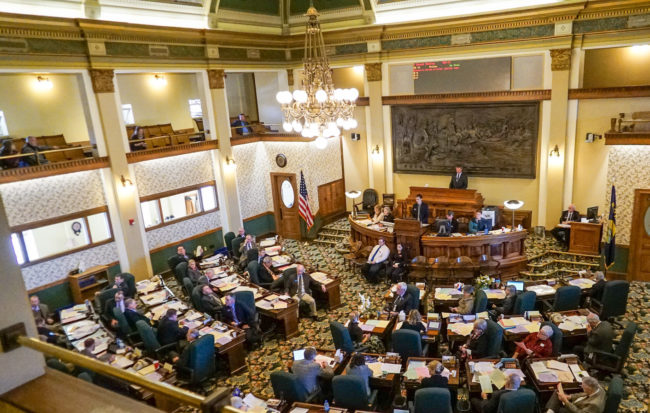
By Anne Hedges
This session is a doozy. The Senate began with a power struggle that continues to this day. National politics emboldened some legislators who have introduced bills and resolutions to ask Congress to give the President more power, to eliminate state environmental protections, and to give federal environmental programs to the state (counter to 50 years of law). Fortunately, some of the worst bills have failed but far too many remain.
Climate denial is alive and well, and it’s not uncommon to be gavelled down in committee for mentioning climate change. Unfortunately, this denial of science and the need to transition to clean energy has resulted in a full-scale attack on clean energy (see article on pg. 12) and the Montana Environmental Policy Act (see article on pg. 10).
Clean water is also under assault, from removing a requirement that coal mining companies prevent violations of water quality standards to abolishing any mechanism for the state to protect water bodies from algae-spawning nutrient pollution (see article on page 24). And don’t think that water rights will be unscathed either; developers are looking for ways around a district court decision that protected senior water rights holders and natural resources from subdivisions that exploit the exempt well loophole and drain limited underground aquifers (see article on pg. 21).
The national hype around a wacky plan to create a fictitious new type of purportedly clean and safe nuclear reactor has reached a fever pitch in the halls of the Capitol. A Colstrip legislator is determined to replace the Colstrip plant with a nuclear power plant and make the area an international hub for uranium enrichment and a statewide hub for future nuclear waste disposal (see article on pg. 16). While many people are “nuclear curious” due to concerns about climate change, nuclear isn’t yet a climate solution because the advanced technology doesn’t exist while climate change does, as do the tools to solve the problem – tools that are cheaper, safer and less harmful to Indigenous communities and public health.
But it’s not all gloom and doom. MEIC’s staff have worked hard to kill or amend dozens of bad bills. While we can’t fix everything, we are well on our way to making this session far less harmful than it otherwise could be. In fact, there are some cases in which we are actually improving the law.
Finally, it is easier to fix or kill bills during the second half of the session, as legislators in the second house are usually more critical of bills from the other house. Responsible legislators often fix things that won’t work or may land them in court, and the inevitable fighting between the Senate and the House provides avenues to work with unusual allies.
While we now know most of the bills that will be considered in the second half of the session, we also know that legislators find ways to introduce bills past the normal deadlines. So MEIC’s team will be on the lookout for mischief and will let you know when it’s time for you to step in and step up with calls to your legislators. For your continued help and encouragement, we are profoundly grateful.
This article was published in the March 2025 issue of Down To Earth.

